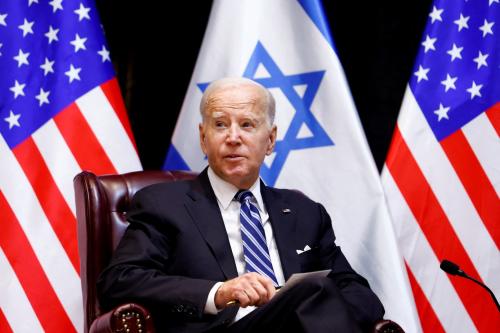On Thursday night, Americans tuned into an unprecedented presidential debate—it was the earliest ever and the first in decades not sponsored and organized by the bipartisan commission on presidential debates. The encounter was the first ever between a former and a sitting president—the question on many minds was which Trump and which Biden would show up? Would Trump the bully make a return appearance, the guy who chased Hillary Clinton around the stage in 2016 and who constantly shouted and interrupted Joe Biden in 2020? Would it be the guy whose stump speeches digress into non-sequiturs about hot dogs, the dangers of electric power boats, and fear of sharks? Or would it be a restrained and mostly coherent Trump trying to convince undecided voters that it was safe to send him back to the White House?
The question for Biden was whether or not he would give any credence to the attacks on his age. Would “Sleepy Joe,” as Trump is fond of calling him, look or act “sleepy”? Would he stare into space for some time as Minority Leader Sen. Mitch McConnell did some months ago? Would he confuse names, dates, and places? Would he trip on his way to the podium? Or would it be the Joe Biden who dominated the stage and his Republican critics during his 2024 State of the Union address?
Donald Trump, who spent months denigrating Joe Biden’s alleged mental decline, believed that he could be beaten in a debate, whatever its format. During the week that preceded the debate, however, Trump realized that he had lowered expectations so far that Biden was likely to exceed them, so he abruptly reversed course and began praising Biden’s performance in the 2012 vice-presidential debate against Paul Ryan.
There were uncertainties about issues as well. Would Biden be able to push Trump, who has bragged about appointing the Supreme Court justices who overturned Roe v. Wade, into a corner on abortion? Would Trump be able to hold Biden accountable for a sharp rise in illegal immigration across the southern border? Could Biden blunt attacks on his economic record and drive home his contention that Trump constituted a threat to democracy, or would Trump turn the tables, using inflation as an economic cudgel—and the alleged “weaponization of the judiciary” as evidence that Biden was the real threat to democracy?
And finally: would there be a “viral moment,” repeated hundreds of times on television and millions more on social media, that would define the debate for the tens of millions of Americans who did not watch it?
So, what happened? To the distress of many Democrats, the Donald Trump who appeared on the debate stage was not nearly as unhinged as he has been in his rallies and in some television interviews. His voice was strong, his demeanor calm, he stuck to his message and did not wander off into bizarre non-sequiturs—although the fact-checkers will have a field day with his many exaggerations and outright falsehoods.
Unfortunately for Biden, his performance played right into the most common critique of his candidacy which is that he is too old to be president. His voice, never strong, was hoarse and weak as he suffered from a cold, especially in the critical opening minutes of the debate. His words were often slurred and hard to understand, and he looked much older than Trump, even though the two are only a few years apart.
Beyond this, Biden misplayed his strongest issue—abortion—while Trump trumpeted his strongest issue—immigration—at every possible turn. It took Biden far too long to say that he was not for killing babies at nine months. And once the abortion segment of the debate ended, Biden never returned to it, even though the principle at the core of the abortion bans—freedom—could have been woven into many other issues. In contrast, Trump used immigration as an explanation for everything, even when doing so made no sense.
There were two areas where Trump also fell short. He lied about many things throughout the debate. He repeated widely debunked claims about massive ballot fraud in 2020 despite dozens of court decisions to the contrary, claimed he presided over the “greatest economy,” said Biden hurt veterans, and argued former House Speaker Nancy Pelosi was responsible for the January 6, 2021, violence. In addition, midway through the debate, Trump simply stopped answering the moderators’ questions. There were queries about climate change, day care, Ukraine, and budget deficits that Trump barely acknowledged, instead launching into campaign attacks saying that Biden was a failed president. But it is not clear voters care about the former president’s misstatements or failure to answer journalist questions.
Nonetheless, this was a bad night for Biden because it seemed to confirm the ongoing narrative about him as too old. Not surprisingly, it unleashed a cascade of anxiety among Democrats about the November election and whether Biden will drag down not just himself but Democrats facing contested general elections around the country. Some went so far as to suggest that Biden withdraw from the race and allow delegates at the Democratic nominating convention to choose a new nominee.
But for an open convention to become a reality, Biden would have to either withdraw of his own accord or a strong opponent would have to challenge him and build a credible campaign among the approximately 4,000 delegates already elected prior to the August convention. Both scenarios are, at this point, long shots. There are many moments that could still reshape the campaign and they will determine whether Biden’s bad night will prove fatal or not.
The Brookings Institution is committed to quality, independence, and impact.
We are supported by a diverse array of funders. In line with our values and policies, each Brookings publication represents the sole views of its author(s).









Commentary
Will Biden’s debate performance turn out to be fatal or just a bad night?
June 28, 2024